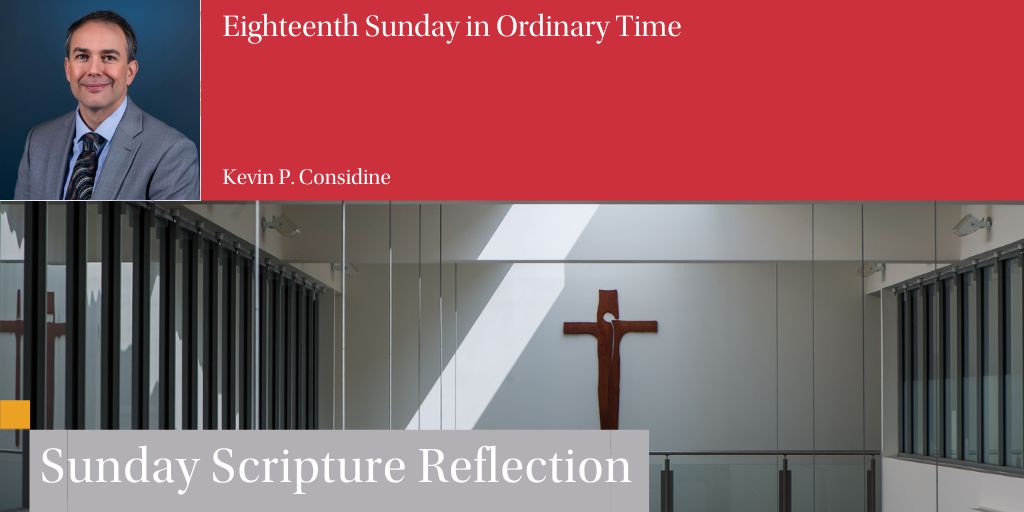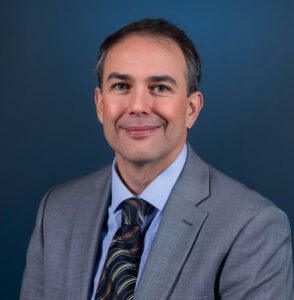

Readings:
Ecclesiastes 1:2; 2:21-23
Psalm 90:3-4, 5-6, 12-13, 14 and 17
Colossians 3:1-5, 9-11
Luke 12:13-21
In June, there were many thousands of us gathered. Nonviolently. Young and old, families and organized groups, children and parents, young adults and grandparents. Rich, poor, middle class. I saw thousands of protest signs and heard laughter, singing, and friendly conversations. I sang with the rally organizers: “I know the one thing we did right/was the day we started to fight/Keep your Eyes on the Prize/Oh, Lord.”
Still, I was worried. Not for my own safety. But for the safety of the crowd. After all, we live in a context of rising authoritarianism. A few days earlier, California’s National Guard had been unjustly nationalized as a kind of police force and deployed to Los Angeles. So, I got down on my knees, closed my eyes, and prayed my rosary. Each decade I dedicated to a different intention: safety, sacredness, liberation, forgiveness, healing. I stood up. A young man with a bandana covering much of his face (for fear of surveillance) came over. He asked me:
“What were you doing?”
“Praying the rosary.”
“Can I ask you what you were praying for?”
“Of course. Safety for everyone here, justice for the oppressed, healing from division, a better future for our children, and for God’s Spirit to provide.”
He seemed relieved. I could tell he didn’t trust “religious” people. After all, this wasn’t Chicago. This was my former home—the more secular Pacific Northwest— and it was hard to find visible religious leaders who were there to simply support the protesters through their vocations as clergy. He thanked me, we said a few more kind words, fist bumped, and we went our separate ways. I continued to mingle with the crowd and pray.
I tell this story not to “boast” as St. Paul cautions against. I offer it as a living entry point into today’s readings. Because something is wrong in our nation. There is a moral and spiritual rot in the body politic and countless people feel it in their souls. To paraphrase Gustavo Gutierrez, human dignity and the common good are being distorted in service to an idol of death rather than the God of Life. We live in a time of idolatrous and nefarious political absurdity.
In the first reading, the author of Ecclesiastes reminds us this is nothing new. Great wealth and great power usually lead to spiritual sickness. Across millennia and multiple languages— hevel (הֶבֶל) in Hebrew; mataiotēs (ματαιότης) in the Greek of the Septuagint—the author screams “Vanity of vanities! All things are vanity!” Or “everything is meaningless!” (NIV translation); “everything is pointless!” (CEB translation). Yes. Many feel this in our bodies as we are overwhelmed by the public sanctioning of great harm, dehumanization, and serving evil as “normal” by our political leaders.
In the Second Reading, St. Paul provides guidance. He exhorts:
“Put to death, then, the parts of you that are earthly…and the greed that is idolatry. Stop lying to one another, since you have taken off the old self with its practices and have put on the new self, which is being renewed, for knowledge, in the image of its creator. Here there is not Greek and Jew, circumcision and uncircumcision, barbarian, Scythian, slave, free; but Christ is all and in all.”
Yes. End the lies and deception. Speak truth to one another in private and public. Live compassion deeply to heal the consciences of our brothers and sisters who have lost their way and allow our own consciences to be healed as well. Form, nourish, and maintain the beloved communities of Christ’s Body because each of us indeed is our brother’s and sister’s keeper. We need each other to flourish.
And then there is today’s proclamation from Luke’s Gospel. Jesus offers scathing words to those who hoard wealth and power and distort the common good. Jesus warns his followers: “…God said to [the rich man], ‘You fool, this night your life will be demanded of you; and the things you have prepared, to whom will they belong?’ Thus will it be for all who store up treasure for themselves but are not rich in what matters to God.” Jesus continues, “Take care to guard against all greed, for though one may be rich, one’s life does not consist of possessions.”
Finally, the Psalmist points the way forward for all of us, “If today you hear God’s voice, harden not your hearts.” Yes! There is a way forward to bring about a greater measure of human dignity and the common good. We begin by hearing God’s voice in the deepest parts of our being. Let God’s Word be one of conviction and transformation to give us hearts of flesh and not stone; hearts that hurt when ICE abducts our neighbors and imprisons them in private facilities without judicial review and where conditions are harsh and death is becoming common; hearts that are pained by a white nationalist agenda that attacks our fledgling multiracial democracy that is actually only 60 years old (established through the 1965 Voting Rights Act); hearts that are crushed when health care and social support is taken away from millions of poor and vulnerable brethren; hearts that cry out when war and violence are waged profligately and human lives made expendable if they do not belong to the “right” nation, religion, or people.
And let our broken hearts lead the way to decisive action. As we move forward, may all of us find the courage to embrace our vocations and embrace the freedom offered by living in community (family, lay, or religious) for human dignity and the common good. This is especially true for religious orders, whose vows of poverty, chastity, and obedience to their communities for the sake of Christ are incomprehensible to the current power structure that understands only hoarding wealth and wielding power. They have a unique freedom to offer moral leadership through action in this time of growing crises.
Together, we as the ecclesia have the potential to be a sacramental public witness in solidarity with the masses who are the “sinned-against” of this political moment. Let us all harmonize with the movement of God’s Spirit in our families, homes, neighborhoods, and communities that brings life and brings it abundantly. And, in this, let us hear God’s voice, soften our hearts, nurture our shared humanity, and take action.
Amen
By Kevin P. Considine